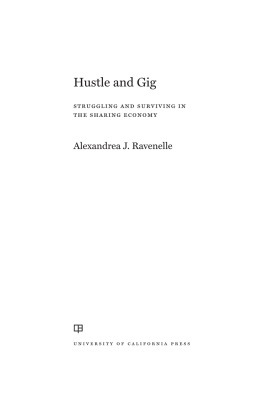SURVIVING
THE NEW ECONOMY
Edited by
John Amman
Tris Carpenter
Gina Neff
First published 2007 by Paradigm Publishers
Published 2016 by Routledge
2 Park Square, Milton Park, Abingdon, Oxon OX14 4RN
711 Third Avenue, New York, NY 10017, USA
Routledge is an imprint of the Taylor & Francis Group, an informa businesss
Copyright 2007, Taylor & Francis.
All rights reserved. No part of this book may be reprinted or reproduced or utilised in any form or by any electronic, mechanical, or other means, now known or hereafter invented, including photocopying and recording, or in any information storage or retrieval system, without permission in writing from the publishers.
Notice:
Product or corporate names may be trademarks or registered trademarks, and are used only for identification and explanation without intent to infringe.
Library of Congress Cataloging-in-Publication Data
Surviving the new economy / edited by John Amman, Tris Carpenter, and Gina Neff.
p. cm.
Includes bibliographical references and index.
ISBN 978-1-59451-249-0 (hc : alk. paper)
ISBN: 978-1-59451-250-6 (pbk : alk. paper) 1. High technology industriesEmployeesUnited States. 2. Professional employeesUnited States. 3.Work environmentUnited States. 4. Industrial relationsUnited States. 5.
Labor movementUnited States. I. Amman, John, 1954- II. Carpenter, Tris, 1968- III. Neff, Gina, 1971- IV. Title.
HD8039.H542U67 2007
331.10973dc22
2006031570
Designed by Straight Creek Bookmakers.
ISBN 13 : 978-1-59451-249-0 (hbk)
ISBN 13 : 978-1-59451-250-6 (pbk)
Contents
John Amman, Tris Carpenter, and Gina Neff
Derek W. Schultz
Gina Neff
Simon Head
Sen Riain
Andrew Ross
Immanuel Ness
Danielle van Jaarsveld
Chris Benner
John Amman
Tris Carpenter
John Amman, Tris Carpenter, and Gina Neff
Surviving in the New Economy: Sharecroppers in the Ownership Society
John Amman, Tris Carpenter, and Gina Neff
For many Americans, the promise of thriving in the new economy has been replaced with the realities of survival. The dot-com boom of the late 1990s marked the coming of age of the much-heralded new economy, an economic, technological, and social transformation that had been in progress for decades. The same entrepreneurial spirit that characterized the stock market frenzy is still expected of high-tech employees. A highly mobile and in many cases highly compensated workforce face a multitude of new risks: Jobs are no longer secure nor insulated from global competition, employer-provided health benefits are drying up, and retirement planning is almost entirely the responsibility of employees themselves. These changes are not restricted to the high-tech elite. American workers now face a restructured labor market that asks individuals to bear more responsibility for their jobs, training, and benefits; a global labor market that pushes real wages down; and a broken social contract that replaces the promise of security with the hollow rhetoric of ownership. This book brings together people who are thinking about the challenges that workers face in this new economic environment. While this collection focuses primarily on work in high-tech industries, the implications of these economic changes reach workers at all pay levels and in all sectors, as more Americans find themselves struggling to survive in the new economy. Several writers have addressed the financial changes of the dot-com era and its aftermath (Cassidy, 2002; Brenner, 2002; Henwood, 2003), but there have been few opportunities for activists and academics to debate how these financial changes affect the people who must work within them and what strategies in general will be effective for organizing. The chapters in this book begin that conversation by describing peoples efforts to survive in the new economy through traditional union organizing and, perhaps more importantly, through innovative forms of collective action, political mobilization, community organizing, and social support.
American workers must now navigate changes to the relationship between working people and the economy itself. Initially, the dot-com revolution and the new economy were touted as a new era of personal and economic freedom. The Internet, wireless computers, and cell phones were supposed to free white-collar workers from their nine-to-five routines, but instead have blurred the lines between home and office; leisure and work. After years of uncertainty, factory layoffs, and manufacturing jobs moving overseas, the American dream of the new economy promised jobs with stock options, humane workplaces, and creativity and autonomy for individual workers. Those bold enough to join Internet start-ups thought that they would not only own stock in their company, they would be able to act like company owners with increased power over the day-to-day decisions in their workplacesin short, they felt like they were owners of their own companies. The dot-com bust showed how little power these dot-com partners actually wielded against the grip of financial capital and how much the Internets liberating changes also wrought a darker side of surveillance and overwork.
The term new economy has been with us since the early 1990s, and, although it has already lost much of the hope and excitement that it conveyed before the dot-com bubble burst, it is still difficult to remember that the term was first used in the Democratic Party platform during Bill Clintons 1992 campaign for presidentyears before the first dot-com stock was ever sold. In the New Covenant with Americans, the new economy meant that workers would accept added responsibilities and join in cooperative efforts to increase productivity, flexibility and quality, in exchange for an increased voice and greater stake in the success of their enterprises. Flexible adaptation was always at the heart of the new economy, and nowhere was this trade-off between increased flexibility and rewards made more explicit than in technology industries. It seemed that the new emphasis on high tech computer skills provided the antidote to the massive loss of industrial jobs that had once helped to create the American middle class.
The rise of the new economy marked other losses of the security workers enjoyed during the industrial era. With the stock market booming in the late 1990s, many employees did not mind the shift from traditional pension plans with their conservative investment strategies and government oversight to more flexible 401(k) and other individual savings plans. Individually managed riskbe it in a retirement plan or at the workplaceseemed somehow smarter, and certainly more lucrative, than old-fashioned collective approaches like Social Security. The rapid rise in technology stock prices fueled fantasies and myths of dot-com millionaires and luxurious early retirements funded by mushrooming mutual fund balances. Stock analysts became celebrities as investment gurus, like Peter Lynch of Fidelity who regularly appeared on Fidelity ads in the 1990s, assured us all that in the long run the market always outperformed other forms of investment. The risks of these investments became clear when historically high stock market valuations plummeted.














